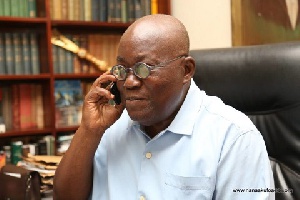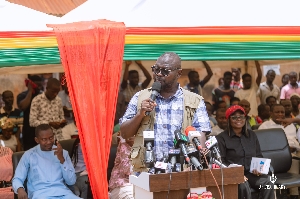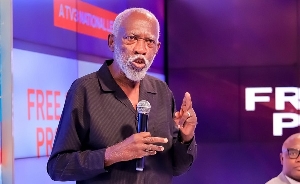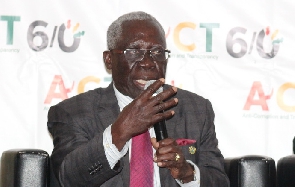 President Nana Addo Dankwa Akufo-Addo
President Nana Addo Dankwa Akufo-Addo
It will be recalled that Richard Dela Skyy, a Citi FM journalist, filed a suit challenging President Mahama's appointment of Mrs Charlotte Osei as replacement for the retired Electoral Commissioner Dr Kwadwo Afari-Gyan. The eyewitness news presenter said the appointment was in breach against vital procedures (hence not procedural). Like the Ghana Bar Association (GBA) case challenging the power and authority of the president (President Mahama) to appoint justices of the Supreme Court without the advice of the Judicial Council, the highest court of the land ruled that to grant such a request will be the height of judicial absurdity.
In the case of GBA, for instance, Joy News' Joseph Ackah Blay who was in court reported the justices as saying that it will be absurd to make it binding on the president to consult and take the advice of the Judicial Council in the appointment of a Supreme Court judge. These cases and the rulings of the honourable court on them generated concerns in the court of public opinion, especially in relation to the meaning of "advice" in the 1992 Constitution.
In my usual street-lawyer analysis, I want to share my OPINION on the matter relating to the appointment of independent officers of the Constitution by a partisan President, as decided and ruled upon by the Supreme Court of Ghana. Let me emphasise that my opinion is just to contribute to the public discussion of the matter and not intended to scandalise or disrespect the Court or lower its authority. This case bothers on the "Other Functions of the Council [of State]" as titled in our Constitution. Apparently, the SCOG ruled that the "advice" of the Council of State is not binding on the President. The advice of the Council on appointments of independent officers as set out in the Constitution such as Electoral Commissioner, CHRAJ Commissioner, NCCE Chairperson, Chief Justice (or Judges), IGP, Immigration Director, Government Statistician, Auditor-General, Central Bank Governor etc. First, it is important to state unequivocally that a piece-meal reading and interpretation of the text of the Constitution may not relate to the intent of the Framers. We need to do a wholesome reading to get the interpretations right. Meanwhile, the apex court reserves the exclusive authority to “determine true and proper meaning of constitutional [any] provisions” of the Constitution.
At this point, I begin with a quotation of the relevant provisions of the Constitution. As framed, article 91 (1)-(4) titled "Other Functions of the Council [of State]" reads:
"(1) The Council of State shall consider and advise the President or any other authority in respect of any appointment which is required by this Constitution or any other law to be made IN ACCORDANCE WITH [my emphasis] the advice of, or IN CONSULTATION WITH [my emphasis], the Council of State.
(2) The ADVICE [my emphasis] referred to in clause (1) of this article shall be given not later than thirty days after the receipt of the request from the President or other authority.
(3) The Council of State MAY [my emphasis], upon request or on its own initiative, consider and make RECOMMENDATIONS [my emphasis] on any matter being considered or dealt with by the President, a Minister of State, Parliament or any other authority established by this Constitution except that the President, Minister of State, Parliament or other authority SHALL NOT BE REQUIRED TO ACT IN ACCORDANCE WITH [my emphasis] any recommendation made by the Council of State under this clause.
(4) The Council of State shall perform such other functions as may be assigned to it by this Constitution or any other law not inconsistent with this Constitution."
In the relevant article above, I highlight some "keywords" I deem necessary for consideration in order to give a true and fair interpretation of the "Other Functions of the Council [of State]" as intended by the Framers of our Constitution.
In clause 1 of this article, the relevant key terms to consider are "IN ACCORDANCE WITH" or "IN CONSULTATION WITH". If something is done IN ACCORDANCE WITH a particular rule or system, it is done in the way that the rule or system requires it to be done. It is so to say that ACCORDING TO the Constitution the Orders of the Court is law and binding. And when you do something IN CONSULTATION WITH a person or authority you do it considering the expert or professional advice of that person or authority in question. For example, assuming a doctor (say IMF) advises you (say Ghana) to quit taking sugar (say reckless borrowings) after CONSULTATION WITH him. You continue to take sugar at your own peril (say economic breakdown). The question here is; is Ghana ready for the repercussions? No! My lords, it is instructive to state (and without reservation) that, when you CONSULT our Constitution in order to resolve disagreements among us (citizens) your lordships do so for GUIDANCE and INSTRUCTIONS but not SUGGESTIONS (or to exercise your discretion afterwards). Clause 1 is strict.
In clause 2 of this article, the keyword "ADVICE" is derived from clause 1 - relating with the preceding clause. This means that clauses 1 and 2 are both complementary and supplementary to each other. The ADVICE is the compelling information given to the President or any other authority to act upon. For example, if you seek a legal ADVICE from a lawyer, you comply or not to it at your own expense. Are you ready for the negative consequences of your decision?
In appointing independent officers set out by law, clause 3 of the article renders any use of discretion by the President here nugatory. In fact, I must say that clause 3 (unlike clause 1) is not, in the first place, in respect of any appointment required by the Constitution or any other law. This clause is independent from the above-mentioned clauses 1 and 2. Moving forward, anyway, let us consider the keywords "MAY", "RECOMMENDATIONS" and "SHALL NOT BE REQUIRED TO ACT IN ACCORDANCE WITH" as used in the context of the clause. That said, the "MAY" used in this clause (as in others) implies OPTIONAL, VOLUNTARY or VOLITION. It means that the Council of State has a choice to or not make recommendations to the President or any authority in respect of any matter of concern. In simple terms, clause 3 is relaxed. The "RECOMMENDATIONS" of the Council is the suggestions (called or uncalled for) that the Council offers to the President or any authority. Suggestions are not binding! It will be repetitive (if not boring) to reiterate what "IN ACCORDANCE WITH" means again as that has been dealt with already. The other important words are "SHALL NOT" and "REQUIRED". We understand "SHALL" (in law especially) to mean INSTRUCTIVE, OBLIGATORY, COMPULSORY, or MANDATORY. However, "SHALL NOT" may assume the effect of "MAY" (as optional) since "NOT" negates the effect of "SHALL".
Literally, the meaning of "REQUIRED" is not different from "SHALL" (as bound or compelled). The Framers indicated categorically under this clause that the President or any authority has the liberty to act (or not) in tandem with what the Council recommends. The Framers framed clause 3 this way to differentiate the RECOMMENDATIONS under this clause from the ADVICE under clause 1 of this article. Succinctly, if RECOMMENDATIONS are not binding on the President or any authority ADVICE is. Clause 3 is completely different and separate from the other clauses preceding it under article 91. If not so, clause 1 is supplanted by clause 3 and would have been conjoined by the wise Framers. If the functions of the Council of State cannot bite, then it is just a rubber stamp.
With respect, the Framers intended to free or immune those sensitive public offices from partisan politics and cronyism (through the ADVICE of an independent, nationalistic Council of State). In this light, I can't reach a conclusion with the SCOG that the "advice" of the Council is only a suggestion (not compelling) upon the President or any authority. I am sorry, but the understanding I get above makes me struggle so hard to understand the ruling that the ADVICE (under clause 1 and 2) is ADVICE (as mere suggestions). I stand for correction though.
God bless our homeland Ghana and make our nation great and strong.
Thank you for reading.
Mohammed A. Razak Wumpini
0249240121/0200927958












